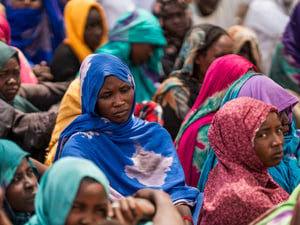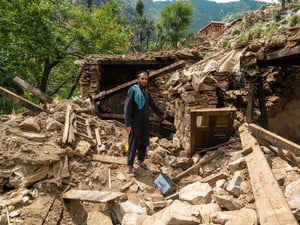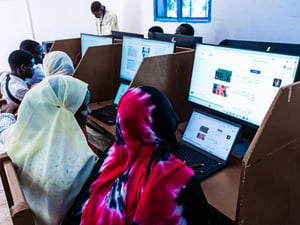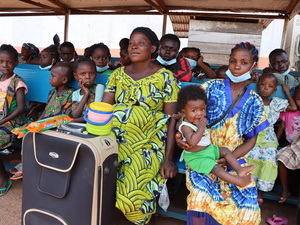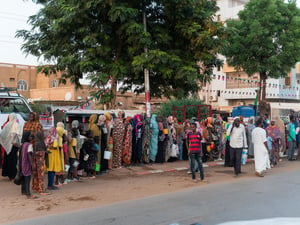Refugees fleeing attacks in north eastern Nigeria, UNHCR watching for new displacement
Refugees fleeing attacks in north eastern Nigeria, UNHCR watching for new displacement
UNHCR is alarmed at the recent wave of attacks on civilians in northeast Nigeria. The brutality and frequency of these attacks is unprecedented. The past two months have seen multiple kidnappings and deaths, creating population displacement both inside Nigeria and into neighbouring countries.
Refugees and internally displaced people alike are reporting acts of extreme violence, and showing clear signs of distress and fear. Some have witnessed friends or family members being randomly singled out and killed in the streets. People speak of homes and fields being burned to the ground, with villages completely razed, or grenades being launched into crowded markets killing people and livestock. There is mention of people being caught in fighting between insurgents and the armed forces, arbitrary arrests under the suspicion of belonging to insurgent groups, and other serious alleged crimes including, reportedly, summary executions.
Terrorized students who had survived attacks on their schools in Adamawa, Borno and Yobe states have told UNHCR how they saw friends being killed or kidnapped. From media reports the April 14th abduction of more than 200 girls in a school in Chibok in Borno state is just one in a series of similar kidnappings from schools in northeast Nigeria in recent months.
Next week will see the first anniversary of Nigeria's declaration of a state of emergency in Adamawa, Borno and Yobe states. In all 250,000 people are now internally displaced, according to the Nigeria Emergency Management Agency (NEMA). Some 61,000 others have fled to neighbouring Cameroon, Chad and Niger. Most are Niger nationals who were living in Nigeria, but 22,000 are Nigerians who have been made refugees by the crisis.
The situation in southern Niger is particularly difficult, with poor security and remoteness compounding the difficulties of provide humanitarian help. In the Diffa region, just across the border from Nigeria, between 700 and 1,000 people are arriving each week. These people are fleeing attacks by insurgents or out of fear of retaliatory action by the armed forces. UNHCR teams in the area say 1,500 people have recently arrived in a single village to the south of Diffa town following an attack on the other side of the border by six insurgents on 20 April. Some lost everything in the attack: 35 houses and 25 shops were burned, food stocks were set on fire, and two men were wounded. At present the refugees are staying in abandoned houses that will be at risk of flooding when the rainy season starts in June-July. We are working with our partners to relocate the refugees to a drier envi ronment.
Including the Diffa region and villages and other sites on Lake Chad, some 100 kilometres to the east, UNHCR and its partner the International Rescue Committee have registered 15,700 people over the past six weeks. These are people who have fled the attacks of recent months, mainly in Borno state. At present we are monitoring the situation for possible new displacement in light of ongoing military operations against suspected insurgents just across the border.
A second area of potential new displacement is across the border from Borno state in Cameroon's Far North Region across the border from Gamboru Ngala in Borno state. Media reports say more than 100 people were killed during a 5 May market day in Gamboru Ngala town. Some 6,800 Nigerian refugees have arrived in the Far North Region since May of last year. 2,500 of these have been relocated to Minawao camp, 150 kilometers away from the volatile border area.
Neighbouring Chad has seen 550 persons arriving from Nigeria over the past year.
For more information on this topic, please contact:
- In Dakar: Hélène Caux (Regional) on mobile + 221 77 333 1291
- In Geneva: Adrian Edwards on mobile +41 79 557 9120

